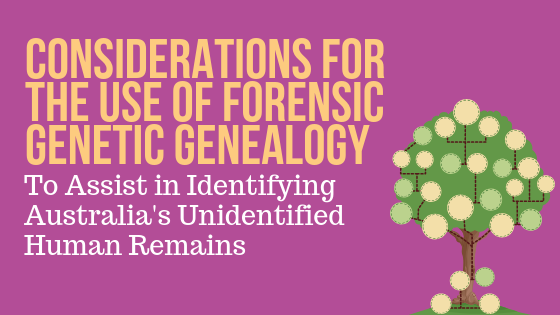It has been estimated that Australia has up to 500 unidentified human remains. The use of forensic genetic genealogy could assist in identifying some of these remains. But the ability to access public genetic information and family tree records requires us to consider the legal and ethical approaches, as well as adopting an internationally consistent model.
Written by: Nathan Scudder, University of Canberra, Australia
This work will prompt discussion in Australia and is intended to bolster international collaboration to develop best practice approaches to using genealogy as part of investigations involving unidentified human remains.
The work builds on the success of the ‘DNA Doe Project’ in the United States, and looks at whether the use of forensic genetic genealogy – and even the model of crowdsourced and crowdfunded analysis – can be applied in an Australian context.
The technique raises a number of legal issues. Microarray-based genetic analysis would likely need to occur overseas, which requires genetic information to pass across borders. Engaging experts in genealogy raises concerns about the security and privacy of personal information. The potential for next of kin to become aware of genealogy work prior to official notification, or to seek access to the genetic information of the deceased, must also be carefully managed.
Legislation in each Australian state and territory creates the office of the Coroner. That office has the power and responsibility to conduct inquiries to determine the identity of a deceased person. Forensic genetic genealogy opens up a range of new possibilities to help establish identity. Ensuring an appropriate framework is developed to allow this capability to evolve is an area of particular interest to me.
Developing an internationally agreed framework would help forensic genetic genealogy to develop to its full operational capacity. It would also ensure that the privacy of individuals and families is respected, and public trust maintained.
My interest in forensic genetic genealogy builds on my long-standing research interest in the policy and legal implications of DNA databases. However, this has also been influenced by some fascinating discussions at previous ISHI conferences about this topic. My goal is to now explore the application and limitations of this technology for coronial casework with relevant Australian stakeholders, and to devise a pathway forward.
WOULD YOU LIKE TO SEE MORE ARTICLES LIKE THIS? SUBSCRIBE TO THE ISHI BLOG BELOW!


